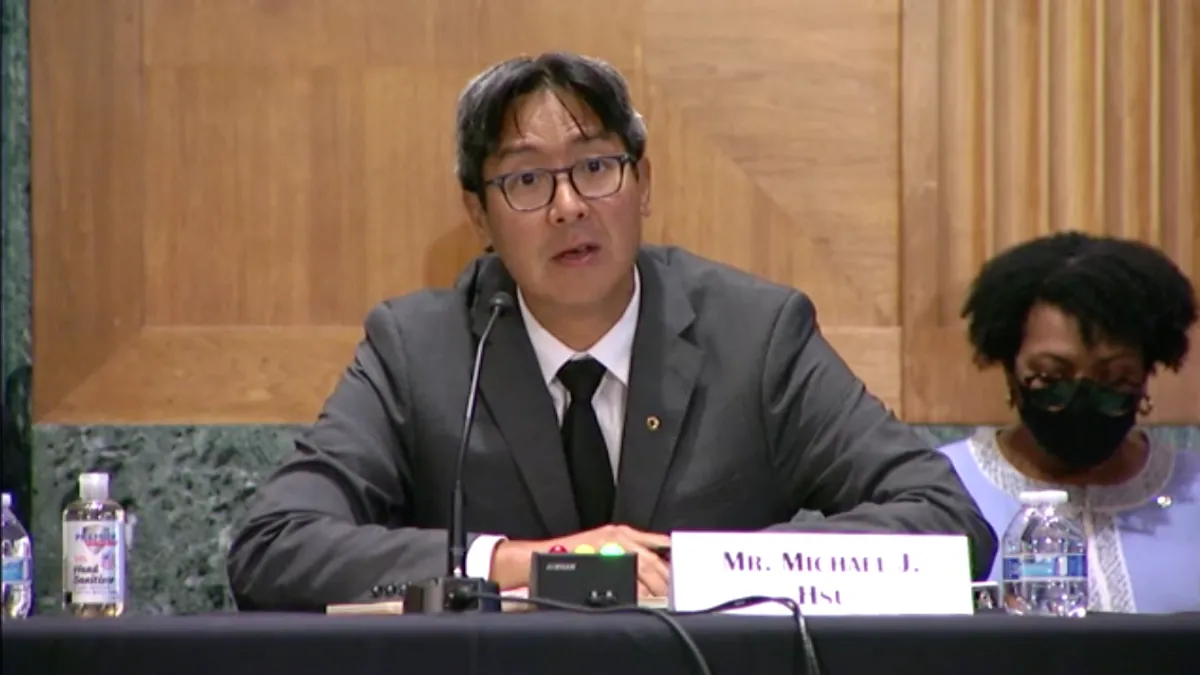The Office of the Comptroller of the Currency (OCC) is working with the Justice Department (DOJ) and fellow bank regulators to review its merger framework, Acting Comptroller Michael Hsu said Monday.
The bank regulator is weighing how it can incorporate public input amid merger proposals, Hsu told attendees of a virtual Brookings Institution event. The OCC is leaning toward holding public meetings on tie-ups involving large banks, Hsu said.
“It is time to rethink how we analyze bank mergers,” he said.
The factors and associated analytical frameworks regulators use to assess mergers have become dated, Hsu said, adding that without enhancements, “there is an increased risk of approving mergers that diminish competition, hurt communities, or present systemic risks.”
Hsu pointed to consolidation, the increase in average asset size and the rise of digital banking as several reasons why merger frameworks need to be revised to reflect the current banking landscape.
Hsu also highlighted the growth of fintechs and neobanks — entities that were arguably nonexistent in 1995, when the DOJ’s Bank Merger Competitive Review Guidelines were last revised.
“[F]intechs like PayPal, Block, Stripe and Shopify have acquired millions of customers and collectively have processed trillions of dollars of transactions annually,” he said. “Additionally, neobanks such as Chime, Current and Aspiration have millions of customers, while big tech firms like Apple and Google have hundreds of millions of users and have expanded into payments and lending products.”
While acknowledging the need for review, Hsu said he didn’t support imposing a moratorium on mergers, as such an action “would lock in the status quo and prevent mergers that could increase competition, serve communities better, and enhance industry resiliency.”
While it conducts its review, the OCC will continue to review merger applications on a case-by-case basis, Hsu said.
“[R]ather than being pro-merger or anti-merger, we need frameworks that are smart on mergers,” he said.
Statutory prongs such as competitiveness, safety and soundness, meeting community needs and financial stability don’t need to be revisited, Hsu said. Rather, “the modes of analysis used by regulators to apply these factors need to be improved,” he said.
Hsu said he believes there is a resolvability gap for large regional bank mergers and suggested tailoring and applying several of the resolvability requirements for U.S. global systemically important banks (G-SIBs) to large regionals to make them more resolvable.
Implementing such changes would require action by the Federal Deposit Insurance Corp. (FDIC) and Federal Reserve, he said.
“Unless and until that gap is addressed, the approvals of large bank mergers risk creating a new set of too-big-to-fail firms,” Hsu said.
The OCC is actively considering conditioning merger approvals on credible and verifiable commitments to achieving resolvability, tailored to the resolution risks of the resulting bank, Hsu said.
“Without such conditions, our approval of such mergers could increase financial stability and [too-big-to-fail] risks,” he said. “These risks give me significant pause and are ones I would need to consider very carefully before approving a large bank merger.”
The OCC’s plans to revisit its bank merger framework comes amid a similar move by the FDIC, which in March submitted a request for information (RFI) regarding mergers involving one or more insured depository institutions.
Plans to revisit bank merger approval practices led to tension on the FDIC board, resulting in the resignation of former FDIC Chair Jelena McWilliams, a Trump appointee.
In December, two Democratic members of the FDIC board — Consumer Financial Protection Bureau (CFPB) Director Rohit Chopra and now-Acting FDIC Chair Martin Gruenberg — published a review of bank merger policies without the approval of McWilliams, sparking partisan arguments about bank mergers and acquisitions, as well as the rules binding the agenda-setting mechanism of the FDIC.
In a question-and-answer session after Monday's speech, Aaron Klein, a Brookings senior fellow, pressed Hsu on the OCC’s decision criteria for approving mergers, such as assessing a bank’s performance under the Community Reinvestment Act (CRA), the 1977 law requiring banks to detail how they lend in low-income areas.
Klein cited University of Michigan study that found 99% of banks have satisfactory or outstanding CRA ratings.
“Why is satisfactory — a bare pass — allowed to move forward?" Klein asked. "Why not incentivize greater performance?”
Hsu referred Klein to the joint notice of proposed rulemaking (NPR) the OCC put out Thursday, in concert with the Fed and the FDIC, which proposed a raft of updates to the law.
“I just highly encourage folks to look at the NPR and see what we're proposing,” Hsu said. “It deals with the grade inflation issue as well as the desire for greater objectivity and transparency in how those ratings are set. That's based on feedback from both industry and others. We're trying to put all that together in a way that we think will be productive towards these points.”





















